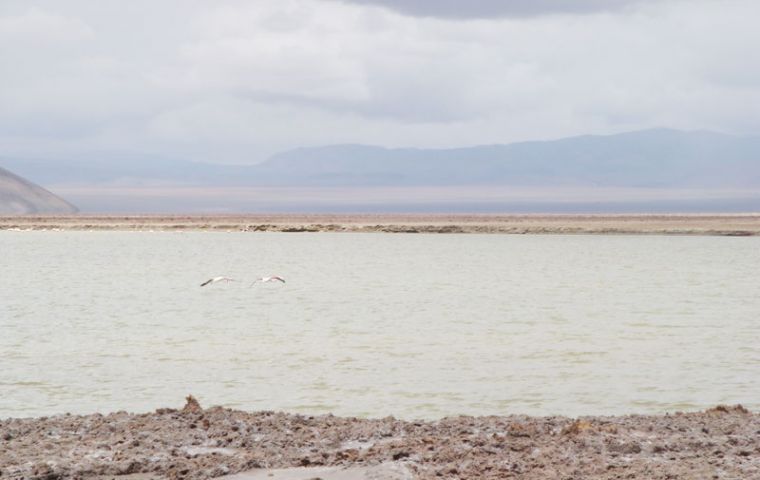MercoPress. South Atlantic News Agency
Argentina and Australian group open ‘world’s largest’ lithium carbonate plant
 The slat flats in the Atacama and Bolivia hold the largest proven reserves of lithium
The slat flats in the Atacama and Bolivia hold the largest proven reserves of lithium Argentine authorities and from Australia’s mining group ADY Resources opened this week the ‘Salar del Rincon’ plant, the “largest in the world” for the production of lithium carbonate in the north of Argentina.
The plant designed by Argentine engineers was set up in the province of Salta, bordering with Chile and Bolivia, and next to the Andes cordillera in a region rich in lithium deposits and 3.000 metres above sea level.
ADY Resources has promised a total investment of 300 million US dollars plus the 75 million already disbursed for the plant, which was described as “the largest of its kind in the world” by the Argentine Mining Secretary in a release.
‘Solar del Rincon’ is generating 100 new jobs in one of the highest and most remotes locations of Argentina.
Lithium is a rare mineral which is strategic for the manufacturing of rechargeable batteries, for the digital industry and pharmaceutics.
The mining secretary office said in the release that of the ten million metric tons of proven reserves in the world, almost nine million are in Latinamerica in an area shared by Argentina, Chile and Bolivia.
Argentina exports lithium to the US, UK, Germany, China, Russia, Japan and Holland.
According to Canadian sources the largest salt-brine lithium reserves, which out of all the naturally occurring reserves, is where lithium can most easily be acquired, are found in salt flats in Chile, South-western Bolivia and North-western Argentina.
Currently, Chile is the world’s largest lithium producer and the Atacama salt flat is by far the most competitive in the world. Argentina is also producing and has attracted a variety of junior miners that are carrying out studies to begin developing new areas. Bolivia has one of the largest lithium deposits in the world and promises to be one of the main players in securing a future lithium supply.
However on 2 March 2011 the Governor of Jujuy Province, Argentina, declared lithium a strategic mineral. The declaration asserts that environmental approval of exploration and exploitation projects in the province will have to be reviewed by a committee that will include representatives from the Ministry of Production, the Argentinean Research Council, the University of Jujuy, the Provincial Parliament, the Provincial Environmental Agency and the Mining Department. Permits granted for exploration and exploitation will be reviewed after this commission is formed in 30 days.




Top Comments
Disclaimer & comment rules-

-

Read all commentsLithium Carbonate !
Mar 20th, 2011 - 11:46 am 0please be careful while digital/internet commenting on Argentina to avoid likely Argentine embargo enforcing.
I can see it now -
Mar 20th, 2011 - 01:29 pm 0“Argentinian embargo designed to cripple Duracel Bunny.
Animal Rights organisations up in arms”.
Commenting for this story is now closed.
If you have a Facebook account, become a fan and comment on our Facebook Page!